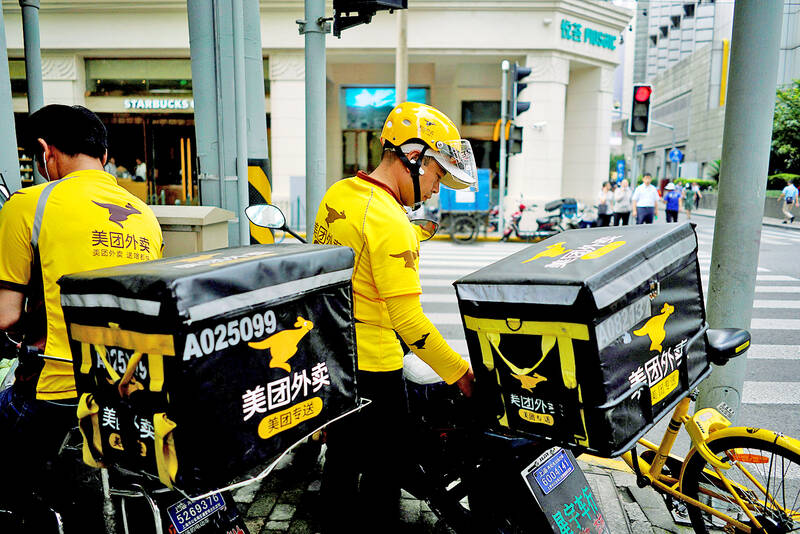Meituan (美團) has unveiled plans to hire as many as 10,000 people this quarter, as the Chinese food delivery company tries to fend off a challenge from ByteDance Ltd (字節跳動).
Meituan’s recruitment drive — which is to span the nation from Beijing to Shenzhen — contrasts with layoffs rocking the tech industry as Silicon Valley titans and start-ups fire people to weather a potential recession.
The campaign is intended to catch an upswing in consumer consumption, the company said in a statement yesterday.

Photo: Reuters
It coincides with ByteDance’s expanding efforts to get into a delivery arena that Meituan dominates, and where Alibaba Group Holding Ltd’s (阿里巴巴) Ele.me (餓了麼) is a distant second.
ByteDance’s Douyin (抖音) — Tiktok’s cousin in China — is testing a grocery and food delivery service in Beijing, Shanghai and Chengdu, and could consider expanding that to more cities, a spokesperson said, confirming local media reports.
Meituan shares yesterday closed 6.5 percent lower in Hong Kong — the lowest level since November last year amid rising concerns about intensified competition.
“Douyin seems to be expanding its ambition beyond cooperation with Ele.me, and wants to do it nationwide,” Forsyth Barr Asia Ltd senior research analyst Willer Chen (陳偉樂) said. “This will lead to more head-to-head competition between Meituan and Douyin.”
If Tiktok’s operator forges ahead with full-fledged services, it could reignite a battle for control of the market that wiped out billions of US dollars in value over the span of a year, before Beijing began to crack down on “reckless expansion of capital.”
Meituan, which continues to report losses, saw revenue surge 28 percent in the September quarter, as demand held up during the downturn. China’s reopening is expected to spur economic activity and benefit Meituan in the longer run.
Douyin is becoming more ubiquitous in China, much like Tencent Holdings Ltd’s (騰訊) super-app WeChat.
Apart from bite-sized clips and live streams, ByteDance’s flagship video forum is making forays into online commerce through services such as grocery and food delivery. That could help ByteDance diversify its revenue from online advertising, and reduce the influence of Alibaba and Meituan over China’s app-based digital economy.
“The local services market in China is large, and penetration is still low, so there can be sustainable growth for multiple players,” Union Bancaire Privee managing director Ling Vey-sern (凌煒森) said. “Douyin has substantial user traffic, but its local service offerings may cater more to push-based recommendations and impulse-buying, rather than Meituan’s more comprehensive services.”

Semiconductor shares in China surged yesterday after Reuters reported the US had ordered chipmaking giant Taiwan Semiconductor Manufacturing Co (TSMC, 台積電) to halt shipments of advanced chips to Chinese customers, which investors believe could accelerate Beijing’s self-reliance efforts. TSMC yesterday started to suspend shipments of certain sophisticated chips to some Chinese clients after receiving a letter from the US Department of Commerce imposing export restrictions on those products, Reuters reported on Sunday, citing an unnamed source. The US imposed export restrictions on TSMC’s 7-nanometer or more advanced designs, Reuters reported. Investors figured that would encourage authorities to support China’s industry and bought shares

FLEXIBLE: Taiwan can develop its own ground station equipment, and has highly competitive manufacturers and suppliers with diversified production, the MOEA said The Ministry of Economic Affairs (MOEA) yesterday disputed reports that suppliers to US-based Space Exploration Technologies Corp (SpaceX) had been asked to move production out of Taiwan. Reuters had reported on Tuesday last week that Elon Musk-owned SpaceX had asked their manufacturers to produce outside of Taiwan given geopolitical risks and that at least one Taiwanese supplier had been pushed to relocate production to Vietnam. SpaceX’s requests place a renewed focus on the contentious relationship Musk has had with Taiwan, especially after he said last year that Taiwan is an “integral part” of China, sparking sharp criticism from Taiwanese authorities. The ministry said

US President Joe Biden’s administration is racing to complete CHIPS and Science Act agreements with companies such as Intel Corp and Samsung Electronics Co, aiming to shore up one of its signature initiatives before US president-elect Donald Trump enters the White House. The US Department of Commerce has allocated more than 90 percent of the US$39 billion in grants under the act, a landmark law enacted in 2022 designed to rebuild the domestic chip industry. However, the agency has only announced one binding agreement so far. The next two months would prove critical for more than 20 companies still in the process

CHANGING JAPAN: Nvidia-powered AI services over cellular networks ‘will result in an artificial intelligence grid that runs across Japan,’ Nvidia’s Jensen Huang said Softbank Group Corp would be the first to build a supercomputer with chips using Nvidia Corp’s new Blackwell design, a demonstration of the Japanese company’s ambitions to catch up on artificial intelligence (AI). The group’s telecom unit, Softbank Corp, plans to build Japan’s most powerful AI supercomputer to support local services, it said. That computer would be based on Nvidia’s DGX B200 product, which combines computer processors with so-called AI accelerator chips. A follow-up effort will feature Grace Blackwell, a more advanced version, the company said. The announcement indicates that Softbank Group, which until early 2019 owned 4.9 percent of Nvidia, has secured a